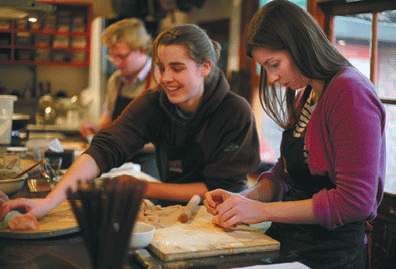Tapping into the expat market
Updated: 2012-01-03 13:48
(China Daily USA)
|
|||||||||||
|
 American Meghan Cochran (left) and Jenny von Reiche from Germany learn how to make dumplings at The Hutong's cooking school. The rising number of expatriates and tourists in Beijing has had a hand in helping businesses that target foreigners flourish. [Wang Jing / China Daily]
|
BEIJING — On a recent brisk afternoon, Meghan Cochran swung by one of China's few remaining hutong areas in Beijing's Beixinqiao district. Huddled around a large kitchen table with a handful of other foreigners, the medical intern set out to master the art of making dumplings.
"It's on my list of things to do before returning to the United States," she said.
The cultural education center she visited, aptly named The Hutong, has been attracting English speakers such as Cochran who seek a deeper understanding of Chinese culture.
The company offers a range of workshops and other classes including tea workshops, tai chi, kungfu, traditional Chinese medicine, photography, writing and painting. Classes range from 60 ($9.46) to 240 yuan.
"We've noticed other cooking schools opening up and other people offering similar services. I mean, it keeps us on our toes," said The Hutong's general manager Morgan O'Hara.
What began in 2007 as a creative space for the company's founders, Australians Mark Thirwall and Stacey Shine, has grown into a steady source of income. "We're quite a humble business. We're profitable. We're sustainable, I mean we have nine full time staff, now," O'Hara said.
The number of expatriates and tourists to Beijing has had a hand in helping the businesses that target foreigners flourish. Last year there were an estimated 110,000 expatriates living in Beijing. The number of overseas tourists to the capital city reached more than 4.9 million in 2010.
"Each year we have at least 100,000 people (come through our doors)," said Feng Cheng, who claims his company China Culture Center (CCC), based in Beijing's Chaoyang District and founded in 2000, is the longestrunning operator of cultural programs.
CCC offers a variety of programs including fengshui, Chinese handicrafts, calligraphy, and even cricket fighting. The majority of the participants are aged between 35-60 and comprise expatriates and their friends.
"My husband is working, so I had to find something creative to do with my time," said one participant who took part in a Chinese knot-tying class.
Although these cultural programs are popular, they rarely make ends meet. In fact, they're sometimes heavily subsidized by the company's other division - travel tours.
"In the beginning my goal was to organize only culture classes, not to organize travel or trips. But just a year later, I had to reevaluate. All the classes that we ran and our off-the-beaten-track tours of the city couldn't cover the cost of running the company," Feng said.
Other companies also smell success off the beaten track. Beijing Hikers, for example, leads groups to mountains around Beijing three days a week. Sun Huilin, the company's founder, began by leading regular hikes on the weekends with friends. The company started by "pure accident", sparked by a lot of interest from outside the group.
"To start the company we needed no money. It was just a group of people going out and we were covering the fees and I was covering a bit of my own expenses," said Sun Huilin, 42, who has since handed over most of the company's duties to her younger sister, Sun Huijie, 32.
The sisters, both art degree holders, have seen their company grow three to four-fold since its inauguration.
"We're running twice as many hikes compared with when we started, plus we specialize in trips for schools, companies, embassies," Sun said. What has allowed cultural companies to prosper, especially in Beijing, is the demand that comes from foreigners interested in the heart of Chinese culture.
"Beijing is different. It's the cultural center of China. Secondly, the foreigners make you feel the culture," Feng said.
Another factor is that each of the companies, regardless of whether they're run by a native Chinese or foreigners, have fluent English-speaking staff. CCC classes are held with the help of a translator. Beijing Hiker's head tour guide Sun has a good grasp of English.
Today's Top News
President Xi confident in recovery from quake
H7N9 update: 104 cases, 21 deaths
Telecom workers restore links
Coal mine blast kills 18 in Jilin
Intl scholarship puts China on the map
More bird flu patients discharged
Gold loses sheen, but still a safe bet
US 'turns blind eye to human rights'
Hot Topics
Lunar probe , China growth forecasts, Emission rules get tougher, China seen through 'colored lens', International board,
Editor's Picks

|

|

|

|

|

|





